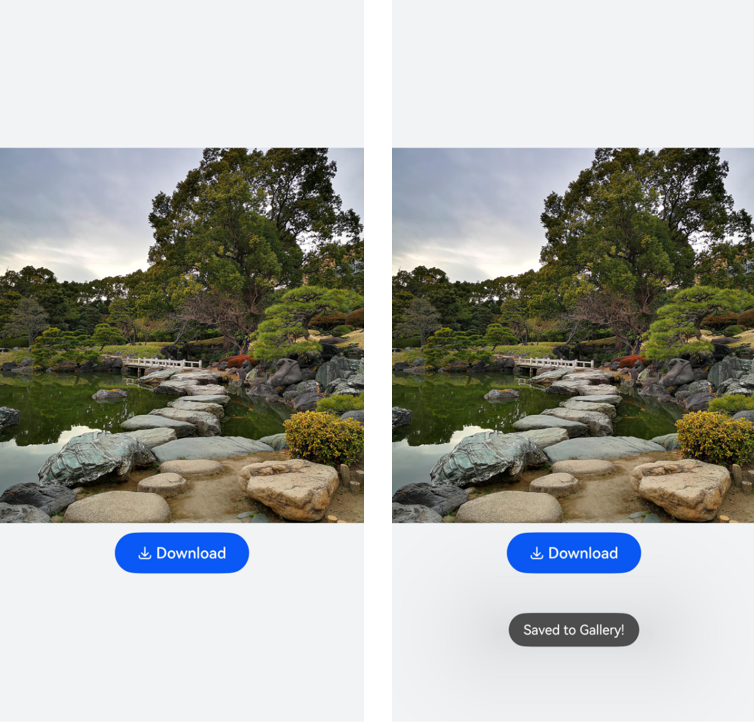harmony 鸿蒙Using SaveButton
Using SaveButton
The SaveButton component comes with the privilege for saving data, which allows an application to temporarily save data without any authorization.
When it is tapped, the application obtains the permission to access the mediaLibrary APIs within 10 seconds. You can use this component when your application needs to save images or videos to the media library.
This component allows for simpler operations than Pickers, which have to start a system application and have the user select a directory for saving the image or video.
The following figure shows the effect of the SaveButton component.

Constraints
When a user clicks SaveButton in the application for the first time, a dialog box will be displayed to request user authorization. If the user clicks Deny, the dialog box will be closed and the application does not have the permission. When the user clicks LocationButton again, the user authorization dialog box will be displayed again. If the user clicks Allow, the dialog box will be closed and the application is granted the temporary location permission. After that, if the user clicks LocationButton again, no dialog box will be displayed.
The interval for calling onClick() to trigger a mediaLibrary API cannot exceed 10 seconds after SaveButton is tapped.
Each time the component is tapped, the application obtains only one-time perform for API calling.
The SaveButton component must be visible and legible to users. You need to properly configure the component attributes such as the size and color to prevent authorization failures. If the authorization fails due to invalid component style, check the device error logs.
How to Develop
For example, to save the image in the dialog box shown above, the application only needs to use the image saving feature for a short period of time in the foreground. In this case, you can the SaveButton component to obtain temporary permission to save the image without requesting the related permission for the application.
- Import the dependencies.
import { photoAccessHelper } from '@kit.MediaLibraryKit';
import { fileIo } from '@kit.CoreFileKit';
- Set the image asset and add the SaveButton component.
SaveButton is a button-like component consisting of an icon, text, and background. Either the icon or text is mandatory, and the background is mandatory. The icon and text cannot be customized. You can only select from the existing options. When declaring the API for creating a security component, you can determine whether to pass in parameters. If parameters are passed in, the component is created based on the specified parameters. If no parameter is passed in, a component with default icon, text, and background is created.
The following example uses the default parameters. For details, see SaveButton. In addition, all security components inherit the Security Component Universal Attributes, which can be used to customize styles.
For details about how to save images to the media library, see Saving Media Assets.
import { photoAccessHelper } from '@kit.MediaLibraryKit';
import { fileIo } from '@kit.CoreFileKit';
import { common } from '@kit.AbilityKit';
import { promptAction } from '@kit.ArkUI';
import { BusinessError } from '@kit.BasicServicesKit';
async function savePhotoToGallery(context: common.UIAbilityContext) {
let helper = photoAccessHelper.getPhotoAccessHelper(context);
try {
// Call createAsset() within 10 seconds after onClick is triggered to create an image file. After 10 seconds have elapsed, the permission for calling createAsset is revoked.
let uri = await helper.createAsset(photoAccessHelper.PhotoType.IMAGE, 'jpg');
// Open the file based on its URI. The write process is not time bound.
let file = await fileIo.open(uri, fileIo.OpenMode.READ_WRITE|fileIo.OpenMode.CREATE);
// Replace $r('app.media.startIcon') with the image resource file you use.
context.resourceManager.getMediaContent($r('app.media.startIcon').id, 0)
.then(async value => {
let media = value.buffer;
// Write data to the file in the media library.
await fileIo.write(file.fd, media);
await fileIo.close(file.fd);
promptAction.openToast({ message: 'Saved to album.'});
});
}
catch (error) {
const err: BusinessError = error as BusinessError;
console.error(`Failed to save photo. Code is ${err.code}, message is ${err.message}`);
}
}
@Entry
@Component
struct Index {
build() {
Row() {
Column({ space: 10 }) {
// Replace $r('app.media.startIcon') with the image resource file you use.
Image($r('app.media.startIcon'))
.height(400)
.width('100%')
SaveButton()
.padding({top: 12, bottom: 12, left: 24, right: 24})
.onClick((event: ClickEvent, result: SaveButtonOnClickResult) => {
if (result === SaveButtonOnClickResult.SUCCESS) {
const context: common.UIAbilityContext = this.getUIContext().getHostContext() as common.UIAbilityContext;
// Obtain temporary permission to save the image without requesting the related permission for the application.
savePhotoToGallery(context);
} else {
promptAction.openToast({ message: 'Failed to set the permission.' })
}
})
}
.width('100%')
}
.height('100%')
.backgroundColor(0xF1F3F5)
}
}
你可能感兴趣的鸿蒙文章
harmony 鸿蒙Application Access Control
harmony 鸿蒙Access Control Overview
harmony 鸿蒙Application Permission Groups
harmony 鸿蒙Application Permission Management Overview
harmony 鸿蒙Application Permissions
harmony 鸿蒙Requesting Restricted Permissions
harmony 鸿蒙Declaring Permissions
harmony 鸿蒙Workflow for Requesting Permissions
- 所属分类: 后端技术
- 本文标签: